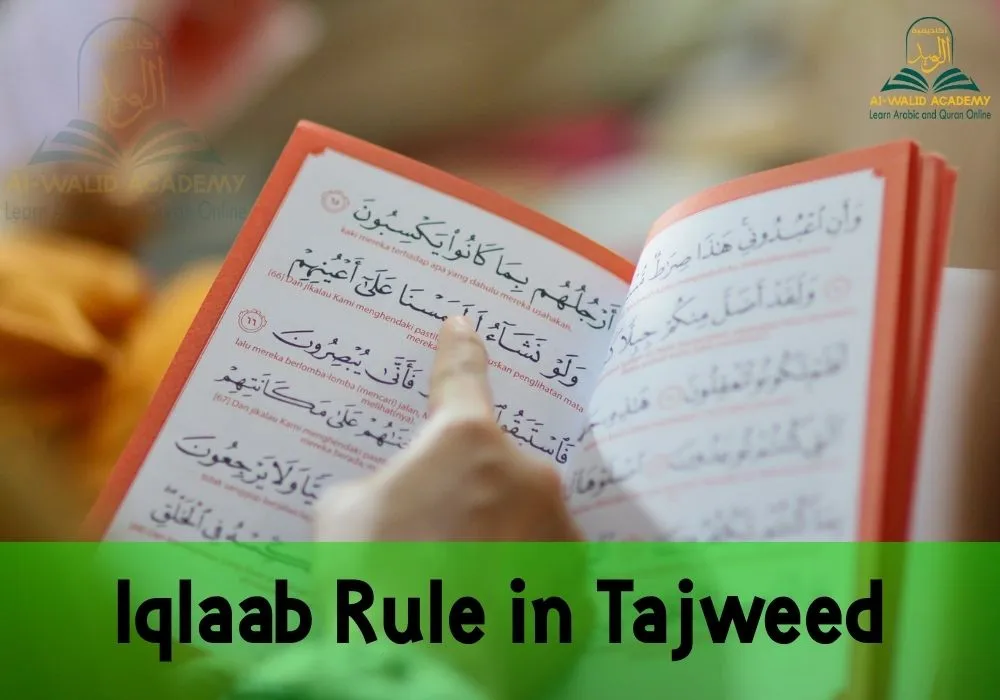You’ve probably heard someone ask, “Is Arabic a hard language to learn?” At first, Arabic might seem tricky with its unique letters and unfamiliar sounds, but once you start learning, you’ll realize it’s full of beauty and rhythm.
Is Arabic a Hard Language to Learn?
A lot of people ask: “Is Arabic a hard language to learn?” It’s not something you can answer with just a yes or no.
Arabic definitely has some parts that can feel challenging—especially for English speakers— but once you understand its system and patterns, it actually becomes logical and fun to learn.
Let’s take a closer look at why some learners find it difficult, and why others say it’s surprisingly easy once you get into it.
At Al-Walid Academy, every Quran Courses Online includes a foundation in Arabic, ensuring that students can appreciate both the sound and the meaning of the verses they study.
Why Arabic Is Considered Difficult
There are a few main reasons that make Arabic seem tough at first:
-
Script and Handwriting: Joining Letters and Shapes
In Arabic, the shape of a letter changes depending on where it appears in the word — at the beginning, middle, end, or when it stands alone.
This can make reading tricky at first, especially for learners used to Latin letters that never change shape.
Arabic is also written from right to left, and handwriting styles vary a lot from person to person, so recognizing words takes some getting used to — but practice makes it natural fast.
Sounds Not in English: ‘Ayn, Ghayn, and Emphatics
Arabic includes sounds that don’t exist in English,
like the deep ‘ayn (ع) and ghayn (غ) sounds, as well as emphatic letters like s, d, t, z (ص، ض، ط، ظ).
These sounds require using the throat or the back of the tongue in a way that feels unfamiliar at first, but with listening and practice, learners pick them up more easily than they expect.
Vowels and Diacritics: Short vs. Long
Arabic pronunciation is built on a clear vowel system —
short vowels (a, u, i) and long vowels (ā, ū, ī) written as alif, waw, and ya’.
The tricky part is that in most Arabic writing, short vowels (diacritics) aren’t shown.
So, beginners might struggle to read correctly at first. Over time, however, learners get used to guessing words through context — and that’s one of the signs you’re really mastering the language.
If you’re struggling with pronunciation or reading, our Online Noorani Qaida Course helps you master Arabic letters and sounds step by step — making the language far easier than it seems.
Roots and Patterns: How Words Are Built
One of Arabic’s most unique features is its root system.
Most words come from three main consonants that carry a core meaning.
For example, the root K-T-B gives you:
kataba (he wrote), kitab (book), maktab (office).
Once you understand how roots and patterns work, you can quickly recognize whole families of related words — making Arabic easier, not harder.
Many learners searching “Learn Arabic Words with Long Vowels” discover that once they understand the root system and structure, Arabic becomes far easier than they imagined.
Dialects vs. Modern Standard Arabic (MSA)
Arabic comes in two main forms:
- Modern Standard Arabic (MSA) — used in writing, news, and formal communication.
- Dialects — the everyday spoken varieties, like Egyptian, Levantine, Gulf, and Maghrebi.
Many learners struggle to choose between them. The best option depends on your goal — if you want to read, write, and understand media, start with MSA.
If your main focus is conversation and travel, learning a dialect might be more practical.
Here’s a quick comparison between MSA and Arabic dialects:
| Feature | Modern Standard Arabic (MSA) | Arabic Dialects |
| Usage | Writing, news, education, formal contexts | Daily conversation and casual speech |
| Understanding | Understood across all Arab countries | Varies from one region to another |
| Grammar | Strict and rule-based | Simpler and more flexible |
| Pronunciation | Consistent everywhere | Changes depending on region |
| Vocabulary | Formal and rooted in classical Arabic | Includes colloquial words and foreign borrowings |
| Difficulty for learners | Needs structured study | Easier for speaking practice |
So, Arabic isn’t really hard — it’s just different.And like any language that’s different from what you know,it needs time, patience, and practice.
But once you start understanding its rhythm and logic,
you’ll realize Arabic is one of the richest and most beautiful languages in the world.

What Actually Makes Arabic Easier (or More Accessible)
Many people, when they first start learning Arabic, get intimidated by the letters and pronunciation.
But after a little while, they begin to realize that Arabic actually has a smart internal system that makes understanding and memorizing much easier than they first thought.
The language is built in a very logical way, with consistent rules that make learning it a step-by-step process.
Let’s take a closer look at what really makes Arabic such a well-structured and approachable language for any learner:
-
Consistent Spelling Once You Learn the Rules
One of the best things about Arabic is that how you write a word is almost always how you pronounce it.
There’s no confusion between letters and sounds like in English or other languages.
Once you understand the rules and get familiar with the alphabet, you’ll be able to read almost any word—even if it’s your first time seeing it.
This makes Arabic a logical and predictable language that doesn’t require you to memorize every single word by heart.
-
The Root and Pattern System: The Secret Behind Arabic’s Organization
Arabic has a brilliant system for forming words, called the root system.
Most words come from a base of three letters that carry a core meaning and branch out into many related words.
Take the root K-T-B (كتب) for example:
From it, you get kataba (wrote), kitab (book), katib (writer), and maktab (office).
That means once you learn a root, you can easily guess the meanings of other words derived from it—saving you time and effort in memorization.
The Tajweed Course not only improves your Quran recitation but also makes Arabic pronunciation much clearer — removing one of the biggest challenges for beginners.
-
Familiar Words You Already Know
Here’s a pleasant surprise for Arabic learners:
- You probably already know quite a few Arabic words without realizing it, since many have made their way into other languages.
Examples include Sultan, Imam, Hajj, and Qiblah. - And if you speak Persian, Urdu, Indonesian, or Swahili, you’ll find even more similarities—since these languages share many Arabic roots.
This makes learning Arabic much faster and easier for speakers of those languages.
-
Minimal Spelling Confusion and Few Exceptions
Another reason Arabic feels comfortable to learn is that it has very few irregularities or confusing exceptions.
Once you understand a rule, it usually applies across most words. There are no strange pronunciations or silent letters like in some other languages.
Everything has a clear reason behind it—giving the language a sense of stability and logical consistency that makes it enjoyable to learn.
trange pronunciations or silent letters like in some other languages.
Everything has a clear reason behind it—giving the language a sense of stability and logical consistency that makes it enjoyable to learn.
For learners who think Arabic script looks complicated, the Quran Memorization Course help you get comfortable reading fluently through guided practice.
Learn Quran, Arabic, and Islamic Studies with certified teachers in fun, interactive, and personalized sessions. Join thousands of students around the world and begin your path today!
MSA vs. Dialects: What Should Beginners Learn First?
One of the biggest questions every Arabic learner asks is: “Should I start with Modern Standard Arabic or jump straight into a dialect?” The truth is — there’s no single right answer. It all depends on your goal.
If you want to understand the news, the Quran, or any kind of formal writing, then you should start with Modern Standard Arabic (MSA).
It’s the version that all Arabs can understand, even if they don’t use it in daily life.
But if your goal is to speak with locals and handle real-life conversations, then dialects will help you more.
Keep in mind, though — MSA is the foundation that every dialect comes from.
Once you’ve built a solid base in MSA, learning any dialect becomes much easier. It’s like learning shortcuts to something you already know.
Which Dialect Fits Your Goal?
Your choice really depends on why you’re learning Arabic:
-
For travel
Learn the dialect spoken in the country you plan to visit. Egyptian Arabic is often the best starting point — it’s easy to pronounce and widely understood across the Arab world.
-
For business or formal communication
Start with MSA, All professional writing, presentations, and official meetings use it.
But at the same time, get familiar with your client’s or partner’s dialect — it makes your communication warmer and more natural.
-
For media or content creation
Go for a dialect that people love hearing — like Egyptian or Levantine (Shami). These are the most common in TV shows, music, and movies, helping you reach a wider audience faster.
Try one of our Online Arabic Conversation Classes and see how quickly you start speaking confidently, if you are still asking “Is Arabic a hard language to learn?”
How to Bridge from MSA to a Dialect Smoothly
Many learners think they must choose between MSA and a dialect — but actually, you can learn both if you follow a smart path:
- Start with MSA, Learn the grammar, sounds, and sentence structure. Once you understand the logic of the language, dialects will feel like simpler versions of it.
- Listen a lot to the dialect you want, Watch series, podcasts, or YouTube videos in that dialect. Your ear will naturally adapt over time.
- Compare as you go, For example, in MSA you say “ana ureed” (I want), in Egyptian it’s “ana ‘ayez”, and in Levantine it’s “biddi”.
The more you notice these differences, the faster your brain connects them. - Speak and practice — even with mistakes.
That’s how every learner improves. Daily practice is the key. Over time, you’ll move between MSA and dialects with confidence.
If you’re just beginning your journey, “Learn To Read Arabic For Beginners” is the perfect first step — mastering the script will make everything else fall into place.
Proven Strategies to Learn Arabic Faster
Not everyone who starts learning Arabic reaches the same results at the same pace.
The difference isn’t about intelligence or memory — it’s all about the method you use.
If you follow a few simple but smart steps, you’ll notice real progress in a short time.
Let’s talk about some practical ways that make learning Arabic easier and faster.
Where to Start: The Script or Pronunciation?
This is the question most beginners ask: Should I start by learning to read and write? Or should I focus on pronunciation and speaking first?
Here’s the simple truth:
- If your goal is to read the Quran or write in Arabic, start with the letters. Learn how each letter looks, how it’s pronounced, and how it changes shape inside words. This builds a strong foundation that helps you later understand any written text easily.
- If your goal is to speak and understand quickly, focus on listening and pronunciation first. Listen, repeat, and train your ear to catch the sounds of the language. Once you move to writing, you’ll find the letters familiar because you already know how they sound.
Learn the Words People Actually Use
Many learners waste time memorizing difficult or rarely used words — that’s not efficient.
Start instead with the words you hear every day: like أنا (I), إنت (you), فين (where), إمتى (when), عايز (want), بيت (house), شغل (work), أكل (food), وقت (time), جميل (beautiful)..
Once these words become part of your active memory, you can easily form simple sentences and understand others faster.
Here’s a smart trick: learn full sentences, not just single words. For example: أنا عايز أروح (I want to go) or فين الحمّام؟ (Where’s the bathroom?).
These ready-made phrases make your speech sound natural and help you talk without pausing to think about each word.
People often think “Is Arabic a Hard Language to Learn”, but once they start focusing on Harakat in Arabic Language, they realize these small vowel marks actually make reading and pronunciation much clearer.
Take Small, Steady Steps
Here are a few simple tools that’ll help you improve faster if used right:
- Shadowing (Voice Imitation): Listen to a native speaker and repeat after them with the same rhythm and tone. This improves your pronunciation and boosts your confidence in speaking.
- Graded Readers (Simple Stories): Start with short stories written in easy Arabic. You’ll pick up new words naturally from the context — no stress, no boredom.
- Micro Habits: You don’t need to study for hours. Ten minutes a day is better than three hours once a week. Consistency matters more than quantity — every minute counts!
Tutor or Self-Study? Which Is Better?
Both methods work — it depends on your level and goals:
- If you’re a complete beginner: A tutor will help you start correctly from day one and fix mistakes before they become habits.
- If you already know the basics: Self-study works great. Use apps, videos, and books — but stay organized and consistent.
The best approach? Mix both
Study a bit on your own every day, and take tutor sessions from time to time to improve pronunciation and conversation.
Combining both is the fastest, most balanced way to master Arabic effectively.
Common Mistakes to Avoid When Learning Arabic
A lot of people start learning Arabic with great excitement, but after a while, they feel stuck or stop improving.
The problem isn’t always that Arabic is “hard” — it’s usually a few learning habits that slow things down without you realizing it.
1. Thinking in your native language while speaking Arabic
Literal translation is the biggest trap! Arabic has its own word order and unique ways to express ideas.
Try to memorize phrases as they’re actually said — not word by word.
- Memorizing grammar rules without using them
Many learners focus too much on grammar and forget to practice. Grammar alone won’t make you fluent — using the language will. Speak, even if you’re not perfect. Mistakes are part of the process.
3. Being afraid to make mistakes
Some people wait until they’re “ready” to speak — that day never comes! Just start talking. Every mistake helps you improve.
4. Mixing dialects too early
Stick with one version of Arabic first — either Modern Standard Arabic (MSA) or one specific dialect.
Once you’re confident, you can explore others. If you mix them from the start, you’ll only confuse yourself.
5. Learning without a plan
Learning one day and skipping the next week won’t get you far.
Stay steady; even 15 minutes a day can make a big difference. Progress in Arabic is about consistency, not long study sessions.
If you’ve ever said, “Teach Me How to Speak Arabic,” the key is to start listening and repeating simple daily phrases — it’s easier than memorizing grammar rules first.

Learn Arabic with Al-Walid Academy — The Easier, Smarter Way
If you’ve always wanted to learn Arabic without feeling overwhelmed or bored, Al-Walid Academy is the perfect place to start.
It’s not just online lessons — it’s a full experience that helps you live the language, not just memorize it.
What Makes Us Different?
- Step-by-step structured lessons that make learning clear and simple.
- Native Arabic teachers who help you master natural pronunciation.
- Interactive sessions with speaking, listening, and real-life practice.
- You can choose between learning Modern Standard Arabic or a specific dialect (like Egyptian or Levantine).
- Regular feedback and progress tracking to keep you on the right path.
Our goal is for you to use Arabic confidently — not just “study” it.
In just a few weeks, you’ll notice how naturally you can speak and understand everyday Arabic.
Start today with Al-Walid Academy and make Arabic a part of your daily life, not just another subject.
Learn Quran, Arabic, and Islamic Studies with certified teachers in fun, interactive, and personalized sessions. Join thousands of students around the world and begin your path today!
FAQs
What’s the smarter move for beginners — MSA or a dialect?
It depends on your goal. If you want to work or study, MSA is best.
If your goal is travel or conversation, start with a dialect.
Can I learn Arabic on my own?
Sure! But having a teacher or joining a program like Al-Walid Academy helps you progress faster and avoid mistakes.
Should I start with reading or speaking?
If you want to read or study the Quran, start with the alphabet.
If your goal is to speak fast, start with listening and pronunciation.
How long until I can speak Arabic?
With consistent daily practice, most learners start speaking confidently within three months!





